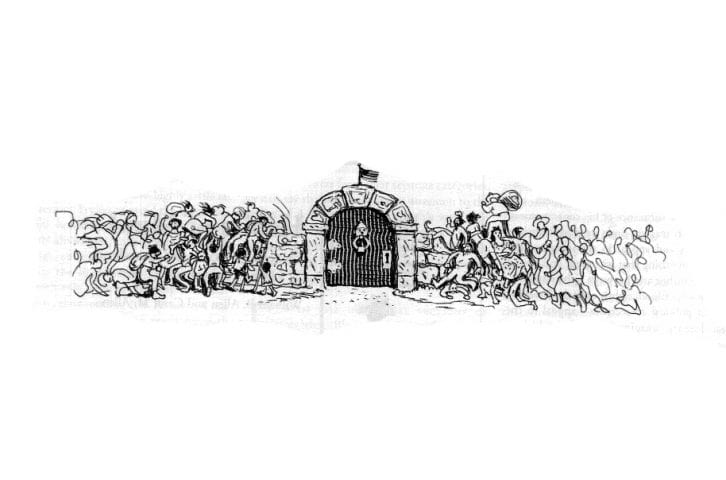Books Reviewed
Out of the fog of the 1960s and the trauma of Vietnam emerged many celluloid specters, but two were especially horrifying: Oliver Stone’s gaseous epics, JFK and Nixon. Stone’s testimony about American politics is that nothing is what it appears to be, with corporate tycoons and secret agents wielding power far beyond the reach of the law and ballot box. In this rambling memoir of his work as a Democratic congressional aide and one of Stone’s staffers and co-producers, Eric Hamburg shows that the director is just as weird as his movies. Hamburg (whom Stone fired in 1996 after accusing him of spying for the government) details Stone’s abusive behavior toward retainers and strangers, corrosive paranoia, and apparently prodigious appetites for sex, liquor, and drugs.
Stone’s critics have rightly fretted about his films’ influence over generations to come, the less discerning of whom might actually take them to be true. But as Hamburg’s own career attests, the Stone Zeitgeist is also powerfully alive today in Washington, D.C. Most recently, the Left’s inability to come up with a credible or even coherent critique of President Bush’s war against Saddam Hussein forced it to fall back on the noxious speculation that he was sending men and women to kill and die on secret orders from the oil companies, various powerful pro-Israel Jews, and the corporations that will profit from rebuilding Iraq. Many leftists insisted that President Bush lacked the moral standing to go to war because his true motives were undisclosed. Just as Stone might have, they said and perhaps even imagined that he was in the thrall of dark and secret powers.
Stone’s attacks have caused pain and consternation in at least two public clans so far. While Lyndon Johnson’s family kept silent after Stone implicated him in the Kennedy assassination in JFK, the media slammed the film ruthlessly. In Nixon,Stone did not say or show a single purely honest thing about the 37th president or his first lady. Hamburg writes that he was particularly proud of Joan Allen’s Oscar nomination for playing Pat Nixon; and yet if Mrs. Nixon had heard the false words Stone’s writers put in the actress’s mouth, it would have broken her heart. Unlike LBJ’s heirs, the Nixon family assumed they would not get much if any support from the media, so they took an uncompromising public stand against the movie themselves.
As Hamburg admits, Nixon was a commercial failure. Perhaps the Nixon family’s statement played a part in that outcome. Hamburg also notes correctly that I sent a copy of the shooting script, which had been leaked to us, to former CIA Director Richard Helms, who promptly threatened to sue Stone for libel. The director cut the Helms scenes out of the theatrical release. Hamburg writes that he suspects it was because Stone was scared. All threats of lawsuits evidently scare Stone, who thinks that everyone is out to get his money. Any living victims of future Stonings should take note.
Like Stone’s movies, Hamburg needed an editor. Anthony Hopkins’s “impression of Oliver Stone had me on the floor laughing,” the author reveals on page 119 and again on page 151. There are baroque passages about Hollywood deal-making and such bracing insights as “What sells in Hollywood are action movies, cartoons, sex, violence and anything that is sufficiently weird, but not intellectually challenging” and “If anything goes wrong, which it usually does, the film falls behind schedule and goes over budget.” Hamburg devotes many numbing pages to his grudge against a colleague in the Stone office, Danny Halsted, whom he calls “Danny the Weasel” about 39 times (even in the index), accusing him of stealing Hamburg’s ideas and conspiring against him and others in the ugly maelstrom that seemed always to surge around Oliver Stone. Even taking into account everything we know about the Nixon White House, it was like a church altar guild meeting compared to Stone’s shop. An especially low point was when, as Hamburg relates, Stone asked a makeup woman to perform a sex act on Hopkins to calm him down. To his credit, Hopkins was appalled.
Hamburg joined this bizarre project after a stint as a congressional aide, where he helped mount the effort to release the John F. Kennedy assassination files. Based on his meetings with Cuban officials, Hamburg has come to believe that anti-Castro Cubans did the crime. He is seemingly oblivious to how eager Havana might be to find a credulous mouthpiece for its baldly self-serving theory. Along with Stone and a cavalcade of wishful thinkers among the Kennedy faithful, Hamburg has also embraced the equally dubious theory that Kennedy was about to withdraw U.S. troops from Vietnam in November 1963. He points out that 100 Americans died in Vietnam under Kennedy and over 58,000 under Johnson and Nixon. Put another way, of course, Nixon honorably ended the war that his two predecessors had begun and bungled. That is a hard truth for the likes of Stone and Hamburg, which seems to be the main reason we have these two bad movies and one bad book.





